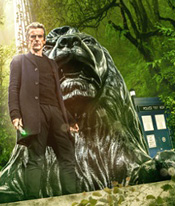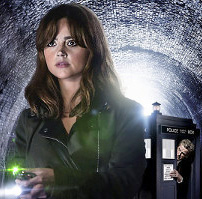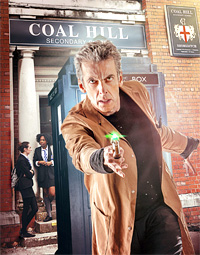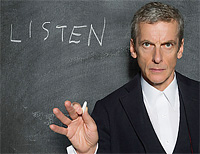Samuel Anderson
Doctor Who: “Last Christmas” (2014)
Contains spoilers. Seriously, don’t read until you’ve seen the episode.
I’ve talked before here on Taking The Short View about how difficult the Doctor Who Christmas Day special balancing act is. It has to deliver an hour’s worth of television that will entertain millions of casual viewers slumped in front of the telly still recovering from their annual turkey blow-out, as well as satisfying the astronomically high expectations of the die hard fans of the show who know every twist and turn of the series inside and out and expect the same high standard from the special if not more. Its the impossible show to write, and more often than not in the past the end result has been at best mixed and at worst quite poor indeed.
It’s not as if you can solve the Christmas Special problem by simply having Santa Claus show up and be the Doctor’s companion for the occasion, now is it? Or maybe you can… After all, season eight saw the legendary Robin Hood asserted as being a real figure, so why not Santa? That’s what the light-hearted cliffhanger at the end of “Death in Heaven” seemed to suggest might be happening and I admit that I was deeply concerned that this was indeed where Moffat was headed. Robin Hood was bad enough, but while the consensus is that he never actually existed Robin was at least based on the tales of a couple of local figures around Nottinghamshire who likely did which makes it just about tolerable. But Santa? How do you have a figure of his, uh, stature appear in the show and not end up with some risible “Oh he was just as robot/alien/impostor” explanation – the likes of which could easily ruin Christmas for children who as a result suddenly start to wonder if maybe Santa isn’t real after all. Christmas Day really isn’t the time or place for that sort of trauma, so best leave Santa well and truly out of it surely? But oh no, not if you’re Steven Moffat: he’s the kind of writer that as soon as the control console lights up with warning lights telling him to alter course, he just locks on and goes straight for it. Rather like the Doctor himself would, in fact. Read the rest of this entry »
Doctor Who S8 E11/2 “Dark Water”/”Death in Heaven” (BBC One)
Contains complete spoilers for the episodes, and for the season.
It’s genuinely hard to know what to say about the two-part season finale that concluded series 8 of Doctor Who this week. It was the most extraordinary, compelling and unique 75 minutes of television I think I have ever seen. But if you ask me whether I enjoyed it, I’d have to say: ‘I’m not sure. Was I actually supposed to?’
 “Dark Water” and “Death in Heaven” were not enjoyable in the sense that, say, 2008’s “The Stolen Earth”/”Journey’s End” had been. That David Tennant story was practically a celebration of all that the modern rebooted series had been up to that point, and it was intoxicatingly uplifting and rousing. By contrast, the final two episodes of Peter Capaldi’s first season in the Tardis could scarcely have been more different: a dark and sombre meditation on some of the most difficult and profound issues pertaining to the human condition, there were no happy endings here and the ultimate feelings it engendered were bleakness and melancholia. The abyss hadn’t just looked back into you, it felt like it had signed a long term lease, moved in and redecorated the walls in the blackest of black for good measure.
“Dark Water” and “Death in Heaven” were not enjoyable in the sense that, say, 2008’s “The Stolen Earth”/”Journey’s End” had been. That David Tennant story was practically a celebration of all that the modern rebooted series had been up to that point, and it was intoxicatingly uplifting and rousing. By contrast, the final two episodes of Peter Capaldi’s first season in the Tardis could scarcely have been more different: a dark and sombre meditation on some of the most difficult and profound issues pertaining to the human condition, there were no happy endings here and the ultimate feelings it engendered were bleakness and melancholia. The abyss hadn’t just looked back into you, it felt like it had signed a long term lease, moved in and redecorated the walls in the blackest of black for good measure.
I said a few weeks ago that “Kill The Moon”‘s foray into full-blown Alien-esque horror refuted the argument that Doctor Who was just a kids’s programme any more, but the season finale took the show so far out of its children’s/family background that it was more akin to a classical and/or religious epic quest story such as Homer’s “Odyssey” or Dante’s “Inferno” or even Charles Dickens’ “A Christmas Carol”. (I’m joking with the comparison: obviously, Moffat is by far the better writer of the quartet!) It gave us a deep examination of death and loss, of love and hate, of grief and despair, of the nature of true friendship, of truth and lies, and ultimately the question of good and evil as the show finally answered the question that the Doctor had asked three months ago in “Deep Breath” when the Time Lord had wanted Clara to tell him whether or not he was a good man. Read the rest of this entry »
Doctor Who S8 E10 “In The Forest Of The Night” (BBC One)
Contains spoilers for the aired episode.
I wasn’t able to watch the latest episode of Doctor Who as it went out live, but I certainly saw the aftermath break out on Twitter. On this admittedly limited sampling of viewer reaction I think it’s safe to say that “In The Forest Of The Night” wasn’t so much disliked as it was actively loathed with lashings of vitriol. It meant that when I finally came to watching the story I did so with some considerable trepidation, wondering what utter disaster I was about to experience.
 Strangely enough, however, for at least 30 minutes this story actually worked for me – and rather well at that. I’ve written before about how I miss the days when the Doctor would just go wandering around a new world finding things to explore like he used to do on Skaro or Vortis during William Hartnell’s tenure; the modern series usually has no such time for such aimless meanderings and every second of every single scene now has to earn its place in the running time by being forced to carry highly condensed industrial quantities of plot exposition and character development. But not this week: during “In The Forest Of The Night” we finally had time to breathe, and it was rather pleasant – at least for a while.
Strangely enough, however, for at least 30 minutes this story actually worked for me – and rather well at that. I’ve written before about how I miss the days when the Doctor would just go wandering around a new world finding things to explore like he used to do on Skaro or Vortis during William Hartnell’s tenure; the modern series usually has no such time for such aimless meanderings and every second of every single scene now has to earn its place in the running time by being forced to carry highly condensed industrial quantities of plot exposition and character development. But not this week: during “In The Forest Of The Night” we finally had time to breathe, and it was rather pleasant – at least for a while.
The bizarre alien world that the Doctor and Clara were discovering and exploring was 21st century Earth, but it was unlike any incarnation of London we’ve ever seen before. If ever an episode of Doctor Who has been inspired by a single image, then it’s surely here with the vision of the modern metropolis completely overrun by trees and plants to the point where Trafalgar Square is a dense forest. It’s kind of the inverse to the opening ceremony of the 2012 London Olympics which depicted England’s green and pleasant lands being torn asunder by sprouting industrial chimneys; here, the trees got their opportunity to take their revenge for that affront. Surely that link can’t be just a coincidence, since this week’s writer Frank Cottrell-Boyce was Danny Boyle’s collaborator for that seminal occasion. Overall it’s the kind of thrilling notion that sends a shiver of delight rather than of fear down your back at the thought, but the question is whether the episode can bridge from this striking imagery and successfully transition into an engrossing story, and the unfortunate answer in this case is … Not really. Read the rest of this entry »
Dr Who S8 E9 “Flatline” (BBC One)
Contains spoilers for the aired episode.
It’s no secret that I’ve been enjoying this new season of Doctor Who a lot more than I did the last, as my broadly positive reviews here on Taking The Short View will attest. Viewer and fan reaction has been more divided however, and even I have to admit that there have been some fairly chunky ‘quibbles’ with each of the episodes to date. For example there were the extraordinarily wide corridors and oversized ventilation ducts in the supposedly ‘impregnable’ Bank of Karabraxos in the otherwise fun “Time Heist”; the lack of any actually interesting ‘A’ plot in “The Caretaker” to balance the banter; the industrial quantities of suspension of disbelief one had to have to hand to swallow the huge amount of bad science on display in “Kill The Moon”; and how last week’s story “Mummy On The Orient Express” was only partially successful in ramming two 30-minute stories into a single 45-minute slot.
 But now we get to “Flatline”, and I find myself in a strange position – almost bereft, in fact – because here we have a story that has nothing to quibble about*. Not one discernible flaw to it at all as far as I’m concerned. What’s a reviewer to do in such a situation? I guess there’s nothing for it but to gush. I’m not used to gushing, but here goes.
But now we get to “Flatline”, and I find myself in a strange position – almost bereft, in fact – because here we have a story that has nothing to quibble about*. Not one discernible flaw to it at all as far as I’m concerned. What’s a reviewer to do in such a situation? I guess there’s nothing for it but to gush. I’m not used to gushing, but here goes.
For once we have a Doctor Who story that feels like it has the perfect amount of material for its running time, and which manages to deliver on all levels without feeling like a mini-anthology story in which one bit of the episode is designated to atmosphere and scares, another to relationship dramas, a moment for ethical dilemmas, some laughs and humour, and then finally some running around action to entertain the youngsters. “Flatline” still has all those components and more, but the way it puts all the pieces together results in a single coherent result that flows naturally from one phase to another, and all in an overall package that resembles the very best of Classic Who in a way more that we’ve seen in years. Read the rest of this entry »
Dr Who S8 E7 “Kill The Moon” (BBC One)
Contains spoilers for the episode.
If in the future anyone ever insists on describing Doctor Who as just a children’s show, sit them down to watch the first half of “Kill The Moon” and then stop the DVD, turn to them, peel the cushion off their face that they’ve been hiding behind, and ask them if they still think that.
 Because blimey, Charlie – that first 20 minutes on the moon was quite something. Fans (myself included) who’ve wanted the show to return to the darker, grimmer, horror-inflected days of Philip Hinchcliffe-produced 1970s Who not only got what what we asked for but had even us saying ‘Whoa, wait a minute, let’s back it down a few notches here!’ It’s a good job that the show aired so late (8.30pm) – as it is, if it had had even longer to establish the incredibly creepy and threatening setting any further than it did, even the watershed mightn’t have been enough to stave off a flood of angry letters from viewers worried why their children turned out all traumatised on Sunday morning.
Because blimey, Charlie – that first 20 minutes on the moon was quite something. Fans (myself included) who’ve wanted the show to return to the darker, grimmer, horror-inflected days of Philip Hinchcliffe-produced 1970s Who not only got what what we asked for but had even us saying ‘Whoa, wait a minute, let’s back it down a few notches here!’ It’s a good job that the show aired so late (8.30pm) – as it is, if it had had even longer to establish the incredibly creepy and threatening setting any further than it did, even the watershed mightn’t have been enough to stave off a flood of angry letters from viewers worried why their children turned out all traumatised on Sunday morning.
It’s not the first time that giant spiders have turned up on Doctor Who of course – I still have fond (if that’s the right word) memories of the antagonists of “Planet of the Spiders” who did for Jon Pertwee’s Doctor in 1974. But back then we knew that the spiders weren’t real because the FX were ever so slightly crap, which was a relief. Not the case in “Kill The Moon” however, where – thanks to some incredibly sharp and precise direction from Paul Wilmshurst – everything appeared terrifyingly real, enhanced by some of Murray Gold’s best incidental music for the show in many a long year. Also to be highly commended is the way that the show reproduced the surface of the Moon via a combination of location shooting in Lanzarote and some digital decolourisation and grading to make it suitably lunar-hued. I would honestly say I’ve never seen the Moon look better on screen in any TV show or film, even 2001. It certainly knocked that studio set they used to mock up the Apollo 11 landings into a cocked hat. (Kidding!) Read the rest of this entry »
Dr Who S8 E6 “The Caretaker” (BBC One)
Contains some mild spoilers for the episode.
I confess, I really wasn’t looking forward to this episode of season eight of Doctor Who, mainly because it seemed it would be very much in the same vein as Gareth Roberts’ previous contributions to the show during Matt Smith’s tenure, “The Lodger” and “Closing Time.” Both of these had milked comedy from making the Doctor a fish of water in a contemporary urban setting – the first in a flat share, the latter by giving him a job in a department store. This weekend’s instalment seemed to offer a retread of much the same ground, with the Doctor this time having to assume the identity of a school caretaker, once again proving how incapable he is of going ‘undercover’ and remaining remotely inconspicuous in any normal setting.
 As a one-off concept in “The Lodger” this sort of thing worked perfectly well, giving Smith a chance to indulge in his most clownish comedy playing alongside James Corden and Daisy Haggard. While it avoided poking fun too directly at the show it was still too much Doctor Who: The Sitcom for my personal taste especially as the plot of the story was largely missing in action. The follow-up episode “Closing Time” tried to compensate for this by having a heavyweight threat in the form of the Cybermen, but that just resulted in the story going all over the place with lots of different influences pulling this way and that before a painfully mawkish and rushed ending. I was, therefore, resigned to “The Caretaker” continuing the downward trend and had little doubt that I would be writing a review that said “not my sort of thing, rather hated it, let’s hope for better next week.” Read the rest of this entry »
As a one-off concept in “The Lodger” this sort of thing worked perfectly well, giving Smith a chance to indulge in his most clownish comedy playing alongside James Corden and Daisy Haggard. While it avoided poking fun too directly at the show it was still too much Doctor Who: The Sitcom for my personal taste especially as the plot of the story was largely missing in action. The follow-up episode “Closing Time” tried to compensate for this by having a heavyweight threat in the form of the Cybermen, but that just resulted in the story going all over the place with lots of different influences pulling this way and that before a painfully mawkish and rushed ending. I was, therefore, resigned to “The Caretaker” continuing the downward trend and had little doubt that I would be writing a review that said “not my sort of thing, rather hated it, let’s hope for better next week.” Read the rest of this entry »
 For the former group, “Listen” must have been a very strange watch – especially at prime time on Saturday evening surrounded by glitzy celebrity talent competitions and quiz shows. Less a mainstream family drama and more of an experimental psychological stage play, “Listen” eschews conventional narrative for mood and atmosphere through a series of connected vignettes where you have to really work hard to figure out exactly what’s going on if you’re to make sense of it. And things are little better for the latter group, the hard-core Who fans, who won’t have seen 50 minute this off-the wall since 1963’s “The Edge of Destruction”/”The Brink of Disaster” two-parter and who will have been even more provoked by the final five minutes in which Moffat once again inserts himself (via his companion character Clara Oswald) into the very core mythos of the show. Along the way, Moffat does something that is keenly uncomfortable for fans of the show: he takes our hero, the Doctor, and deconstructs him, taking him from all-powerful Time Lord to someone as vulnerable and as human as the rest of us. Outrageous!
For the former group, “Listen” must have been a very strange watch – especially at prime time on Saturday evening surrounded by glitzy celebrity talent competitions and quiz shows. Less a mainstream family drama and more of an experimental psychological stage play, “Listen” eschews conventional narrative for mood and atmosphere through a series of connected vignettes where you have to really work hard to figure out exactly what’s going on if you’re to make sense of it. And things are little better for the latter group, the hard-core Who fans, who won’t have seen 50 minute this off-the wall since 1963’s “The Edge of Destruction”/”The Brink of Disaster” two-parter and who will have been even more provoked by the final five minutes in which Moffat once again inserts himself (via his companion character Clara Oswald) into the very core mythos of the show. Along the way, Moffat does something that is keenly uncomfortable for fans of the show: he takes our hero, the Doctor, and deconstructs him, taking him from all-powerful Time Lord to someone as vulnerable and as human as the rest of us. Outrageous!